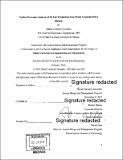Techno-economic analysis of jet fuel production from waste vegetable oil in Mexico
Author(s)
Camacho Gonzalez, Daniel
DownloadFull printable version (4.699Mb)
Other Contributors
Massachusetts Institute of Technology. Engineering Systems Division.
Advisor
Robert Malina.
Terms of use
Metadata
Show full item recordAbstract
This thesis quantifies the economic feasibility of building and operating a biorefinery that converts waste vegetable oils into transportation fuels in Mexico. The hydroprocessing technology selected produces predominately diesel and jet fuel that can be used and blended with the existing fossil fuel infrastructure. The analysis shows that a 4,000 BPD plant located in Mexico can reach a positive NPV of approximately $80 million over a 20-year operating period at an internal rate of return of 15% percent. The minimum selling price for reaching this internal rate of return is $2.21 per gallon for diesel and $2.36 per gallon for jet fuel. If sufficient and reliable feedstock supply exist for a scale-up of the biorefinery to 6500 bpd, NPV increases to approximately $180 million. Sensitivity analyses shows that the NPV for the 4000 bpd facility reaches zero at an internal rate of return of 24%, and that the maximum buying price of the waste vegetable oil at the baseline internal rate of return of 15% percent the plant can afford to procure is $0.73 per gallon, which is 36% higher than the average price for the feedstock in 2013. Finally, the thesis quantifies the commercial opportunity of exporting the produced transportation fuels to the United States where they might qualify for monetary incentives. After accounting for transportation costs the NPV of fuel production in the biorefmery increases to $294 million, 368% higher than if transportation fuels are sold in Mexico.
Description
Thesis: S.M. in Engineering and Management, Massachusetts Institute of Technology, School of Engineering, System Design and Management Program, Engineering and Management Program, 2016. Cataloged from PDF version of thesis. Includes bibliographical references (pages 47-55).
Date issued
2016Department
Massachusetts Institute of Technology. Engineering and Management Program; System Design and Management Program.Publisher
Massachusetts Institute of Technology
Keywords
Engineering and Management Program., System Design and Management Program., Engineering Systems Division.